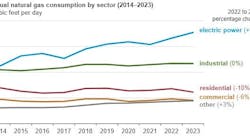Curtis Williams
OGJ Correspondent
PORT OF SPAIN, Oct. 14 -- Three Caribbean governments are to ask Venezuelan President Hugo Chávez to reconsider some of the terms of the PetroCaribe agreement that the governments say run contrary to the spirit of the Caricom treaty.
Prime Minister Patrick Manning of Trinidad and Tobago, Jamaica's Prime Minister P.J. Patterson, and Barbados Prime Minister Owen Arthur met in Barbados to discuss the PetroCaribe agreement and decided that the arrangements had to be reviewed.
Under the agreement, Caribbean countries are to receive crude oil and oil products at significantly reduced prices with the difference converted into a loan that can be paid out in cash or with other commodities, such as bananas and sugar.
This would mean that the region got its supplies from Petroleos de Venezuela SA (PDVSA) as opposed to Trinidad and Tobago's state-owned company Petrotrin, thereby breaching the Caricom agreement, which states that items produced outside Caricom that are available in one of the islands should attract a common external tarrif.
After the talks, Arthur said that although Barbados had not signed the controversial PetroCaribe deal, it had teamed up with Jamaica, which had, as well as with Trinidad and Tobago, to lobby for a rewrite of the agreement.
Arthur said Trinidad and Tobago's Prime Minister would soon take a proposal to Chávez.
Arthur hinted that Barbados and Jamaica were aiming to get Trinidad and Tobago to play a greater role in the PetroCaribe arrangement, importing crude from Venezuela, refining it, and passing it on to Caribbean nations.
"I feel that both Trinidad and Venezuela should be part of the deal," he told journalists, "and, quite frankly, if people want to help us with energy at a time when energy costs are rising and will continue to rise, I think people should join together and collaborate in trying to help the region, rather than people having separate arrangements."
Arthur continued, "So that a Trinidad-Venezuela agreement should be approached in such a way that it would be entirely consistent with the [Caricom] Treaty—that is the way to go. We don't want to have a relationship with Venezuela that would destroy our relationship with Caricom."
Arthur said Barbados could not just "walk away" from a relationship with Trinidad, which processes Barbados's crude oil. While this crude represented small quantities in international terms, he explained, it was vital to the island, which was trying to "explore more [and] to produce more crude oil."
